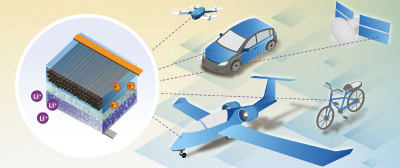"Dream, Dream, Dream! Conduct these dreams into thoughts, and then transform them into action."
- Dr. A. P. J. Abdul Kalam
"Dream, Dream, Dream! Conduct these dreams into thoughts, and then transform them into action."
- Dr. A. P. J. Abdul Kalam
19 Sep 2024
Researchers at Chalmers University of Technology in Sweden claim to have created the strongest battery in the world, one that might be used to build automobiles. The world's most advanced development in massless energy storage, or structural batteries, is described in a new study. These batteries have the potential to reduce laptop weight by half, make smartphones as thin as credit cards, and extend the driving range of electric cars by up to 70% on a single charge.
The team claims that weight and energy usage are drastically decreased when vehicles, such as computers, ships, airplanes, and cars, are constructed from a material that serves as both a battery and a load-bearing structure. "We have succeeded in producing a carbon fiber composite battery that is both energy-dense and as rigid as aluminum, allowing it to be employed in commercial applications. The battery serves multiple purposes simultaneously, much like a human skeleton," explains Richa Chaudhary, a researcher from Chalmers University and the lead author of a recent study that was published in ‘Advanced Materials’.

(Source: Google Images)
There are strict requirements for vehicle designs to be sturdy enough to meet safety standards. There, the structural battery cell of the study team has greatly enhanced its stiffness, or more precisely, its gigapascal (GPa) elastic modulus, from 25 to 70. This indicates that despite weighing less, the material can support loads just as well as aluminum.

(Source: Google Images)
Professor Leif Asp, the head of research at Chalmers' Department of Industrial and Materials Science, states: " The new battery is actually the best ever built in the world, with twice as good multifunctional qualities as its predecessor. Purchasing lightweight, energy-efficient cars is a given if we want to reduce our energy use and consider the needs of future generations. Based on our calculations, electric automobiles with competitive structural batteries might have a 70 percent longer driving range than they have now.''
According to the team, the objective has always been to attain a level of performance that enables the technology to be commercialized. Simultaneously with the ongoing research, the connection to the market has been reinforced by the establishment of the Chalmers Venture firm Sinonus AB, situated in Borås, Sweden.

(Source: Google Images)
Nevertheless, a great deal of engineering work needs to be done before the battery cells be manufactured on a wide scale for our technological devices or cars, instead of just in a lab. "One can imagine that the closest in time are credit card-thin mobile phones or laptops that weigh half as much as they do today," explains Leif Asp. It's also possible that structural batteries power electronics found in automobiles and aircraft. “It will require large investments to meet the transport industry's challenging energy needs, but this is also where the technology could make the most difference.”